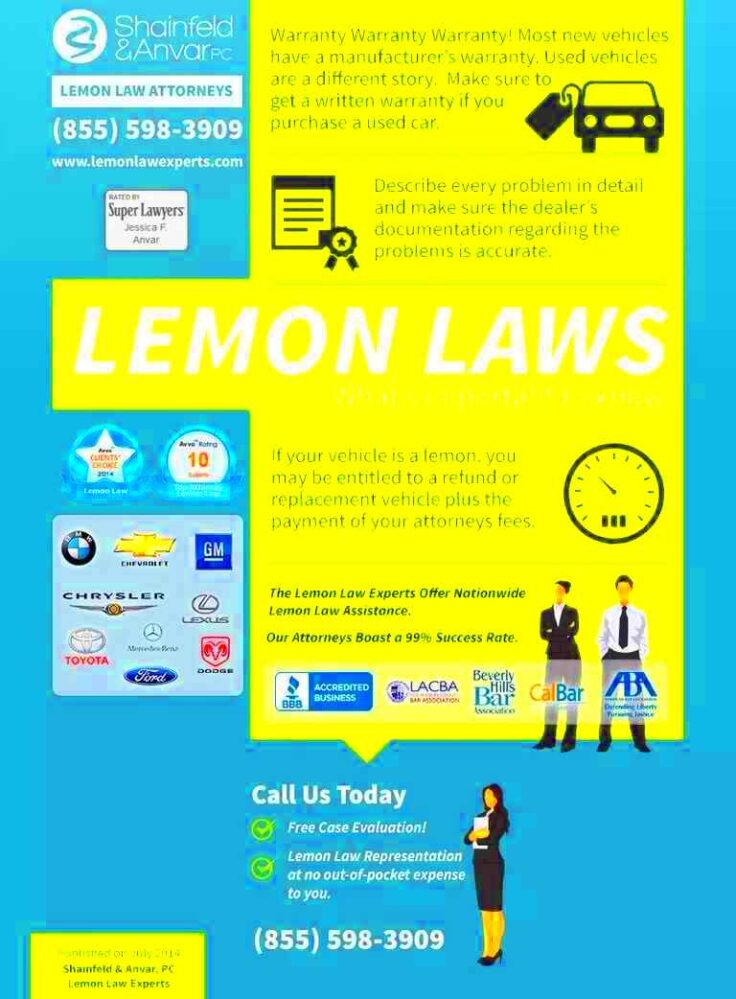Finding a Lemon Law Attorney in Long Island
In New York the lemon law offers protection to purchasers of vehicles that have major flaws. Here’s a summary of how it works.
- Eligibility: Your vehicle must have a substantial defect covered by the warranty. This defect must impair the use, value, or safety of the car.
- Repair Attempts: You should have made several attempts to repair the defect, and the car should still be faulty.
- Timeframe: The law usually applies if the defect occurs within the first two years or 18,000 miles, whichever comes first.
Its important to keep a record of every repair made and maintain communication with the dealer or manufacturer. Having detailed documentation will strengthen your position if you ever need to pursue assistance.
When to Seek a Lemon Law Attorney

When should you consider reaching out to a lemon law attorney? In my opinion its wise to get legal counsel at the stage to prevent unnecessary stress and complications down the road.
Here are a few indicators that it may be time to seek legal counsel.
- Multiple Repair Attempts: If your car has been in the shop repeatedly without resolution, it might be time to get legal help.
- Unresponsive Manufacturer: If the manufacturer or dealer is uncooperative or dismissive, a lawyer can help you navigate these challenges.
- Ongoing Issues: If defects persist despite repairs, an attorney can assist in pushing for a replacement or refund.
Keep in mind that a lemon law lawyer is not only knowledgeable in the field but can also provide you with comfort during a challenging period. Their aim is to help you achieve a resolution without any extra complications.
Qualities to Look for in a Lemon Law Attorney

Choosing the lemon law lawyer can really impact your situation. From my own experiences and discussions with others here are some key qualities to consider:
- Experience: Choose an attorney who specializes in lemon law cases. Their familiarity with the intricacies of such cases will be invaluable.
- Track Record: Look for a lawyer with a history of successful lemon law cases. Ask about their past cases and outcomes.
- Communication Skills: Your attorney should be approachable and able to explain complex legal terms in simple language.
- Client Reviews: Check reviews or ask for references. Hearing about other clients’ experiences can provide insights into the attorney’s practice.
For example a lawyer who takes the time to walk you through each part of the process and keeps you updated regularly would provide more comfort than someone who constantly seems hurried. Building trust and maintaining communication can help make your experience more seamless.
Steps to Find a Reputable Attorney
It can be quite challenging to locate a trustworthy lemon law lawyer, particularly when you’re already dealing with the stress of problems. Based on my own experiences I’ve discovered that taking an approach makes this process easier.
Here’s a guide to help you find the lawyer for your needs.
- Research Online: Start by searching for lemon law attorneys in Long Island. Look for those with positive reviews and high ratings. Websites like Avvo or Martindale-Hubbell offer client feedback and ratings that can guide your decision.
- Seek Recommendations: Ask friends, family, or colleagues if they know of any reputable attorneys. Personal recommendations can be incredibly valuable as they come from trusted sources who have firsthand experience.
- Check Qualifications: Ensure the attorney is licensed and has a specialization in lemon law. You can verify their credentials through the New York State Bar Association’s website.
- Interview Potential Attorneys: Narrow down your list and arrange consultations. This meeting is crucial for assessing the attorney’s suitability for your case. Prepare a list of questions and be attentive to their responses.
- Compare Fees: Discuss the fee structure during the consultation. Most lemon law attorneys work on a contingency basis, meaning they get paid only if you win the case. Ensure you understand the terms before proceeding.
When picking an attorney it’s not only about their skills but also about finding someone you vibe with. Pay attention to your gut feeling during the meeting to see if you would be comfortable collaborating with them.
Questions to Ask During Your Initial Consultation
Meeting with a lemon law lawyer for the first time is a chance to assess their skills and fit for your situation. In my experience asking questions can provide insights into their approach to your case.
Here are some key inquiries to ponder.
- What is Your Experience with Lemon Law Cases? Ask about their background in lemon law and the types of cases they’ve handled. Experience can greatly influence the outcome of your case.
- What is Your Approach to Handling Cases? Understand their strategy for handling cases similar to yours. Are they aggressive negotiators or more inclined towards settlement?
- Can You Provide References? Request references from previous clients. Speaking with them can provide insights into the attorney’s effectiveness and client satisfaction.
- What Are the Likely Outcomes? Discuss potential outcomes and how they plan to achieve them. This will help you set realistic expectations.
- What Are the Fees and Costs? Clarify the fee structure. Will you be charged upfront, or is it a contingency fee? Ensure there are no hidden costs.
Through posing these inquiries you can gain insights into the lawyers skills and determine if they are a good match for your requirements. Its about seeking out an individual who not only has knowledge of the legal system but also shows consideration for and comprehends your unique circumstances.
How to Evaluate an Attorney’s Experience and Track Record
When it comes to choosing an attorney it’s essential to assess their experience and past performance to ensure you’re in good hands. In my opinion a comprehensive evaluation goes deeper than just the surface level information.
Here’s a way to evaluate an lawyers history thoroughly.
- Review Their Track Record: Look for information about past cases the attorney has handled. Did they win similar lemon law cases? Success in past cases can be a strong indicator of their capability.
- Check Their Specialization: Ensure the attorney specializes in lemon law. General practitioners might not have the depth of knowledge required for complex lemon law cases.
- Read Client Reviews: Look at client testimonials and reviews on platforms like Google or Yelp. Honest feedback from past clients can provide insights into their satisfaction and the attorney’s effectiveness.
- Assess Their Communication: Evaluate how the attorney communicates with you. Are they prompt and clear in their responses? Effective communication is crucial for a successful legal process.
- Verify Their Professional Standing: Check their standing with the state bar association. Ensure there are no disciplinary actions or complaints against them.
To sum it up drawing on a track record of success, client reviews and expertise in the field can assist you in selecting a lawyer who is well equipped to manage your lemon law case. Rely on your own research and gut feelings to lead you towards making the decision.
Costs and Fees for Lemon Law Cases
It’s crucial to grasp the expenses linked to lemon law cases, particularly when you’re grappling with the annoyance of a faulty vehicle. Through my personal encounters and discussions with individuals I’ve come to realize that having knowledge about these monetary details can spare you from unforeseen shocks.
Here’s a summary of what you could come across:
- Contingency Fees: Most lemon law attorneys work on a contingency basis. This means they only get paid if you win the case. Typically, the fee is a percentage of the amount recovered, ranging from 25% to 40%.
- Hourly Rates: Some attorneys may charge by the hour. Rates can vary widely based on the attorney’s experience and location. It’s crucial to discuss and agree on the hourly rate and estimated hours before hiring.
- Retainers: A few lawyers might require a retainer fee upfront. This is an advance payment for legal services, which is deducted from the final bill. Make sure you understand how this fee is applied.
- Additional Costs: Besides attorney fees, there could be other costs such as court filing fees, costs for expert witnesses, or administrative expenses. Ensure these are outlined in your agreement.
For example when I was handling a lemon law case grasping these expenses assisted me in keeping my finances in check and steering clear of unexpected surprises. Its crucial to go over all possible charges during your first meeting to ensure transparency and prevent any miscommunication.
Resources and Support for Lemon Law Issues
Handling a lemon law problem can be quite challenging but you dont have to go through it by yourself. There are various resources and support networks that can provide help and guidance during this journey. Based on my own experiences I have witnessed the positive impact these resources can have in settling lemon law conflicts.
Here’s where you can find help:
- Consumer Protection Agencies: Organizations like the New York State Attorney General’s Office offer resources and guidance for lemon law issues. They can provide information on how to proceed with your claim and might offer mediation services.
- Automobile Associations: Groups like the New York Automobile Dealers Association can provide advice and might help mediate between you and the dealer or manufacturer.
- Online Forums and Support Groups: Joining forums or social media groups where others share their lemon law experiences can offer emotional support and practical advice. Sometimes, connecting with someone who’s been through a similar situation can be incredibly reassuring.
- Legal Aid Services: For those who might have financial constraints, legal aid organizations can provide free or low-cost legal assistance. They can help guide you through the legal process and offer representation.
Making use of these resources can greatly impact your approach to your lemon law case. They provide not only help but also a comforting presence during a difficult period.
Frequently Asked Questions
When it comes to lemon law cases, there are often a lot of questions that arise. Here are some of the FAQs along with their responses based on experiences and issues that people commonly face.
- What qualifies as a “lemon” under the law? A lemon is a vehicle with a substantial defect that impairs its use, safety, or value, and that has not been fixed after several repair attempts.
- How long do I have to file a lemon law claim? In New York, you typically have up to 30 months from the date of purchase or the time your vehicle reaches 18,000 miles to file a claim. However, it’s always best to check the specific terms of your warranty and state laws.
- What can I expect from the lemon law process? You can expect a series of steps including documenting the defect, attempting repairs, and possibly negotiating with the dealer or manufacturer. If these steps don’t resolve the issue, legal action may be necessary.
- Will I need to go to court? Not necessarily. Many lemon law cases are settled out of court. However, if negotiations fail, you might need to take legal action, which could involve court proceedings.
- How long does it take to resolve a lemon law case? The duration varies depending on the complexity of the case and the willingness of the manufacturer or dealer to settle. On average, it can take several months to a year.
These responses aim to address some of the issues that individuals often raise regarding lemon law cases. If you have inquiries seeking advice tailored to your specific circumstances reaching out to a lemon law lawyer can offer you guidance.
Conclusion
Dealing with a lemon law case can be tough, but being aware of the steps involved and knowing where to seek assistance can greatly impact the outcome. Based on my personal encounters and stories from others it’s evident that having an attorney support and being informed about your choices can transform a frustrating situation into a more manageable one.
If you find yourself grappling with a faulty car or starting to consider your legal choices keep in mind that there are resources and experts ready to assist you. Take the time to research thoroughly ask questions and select an attorney who not knows the legal aspects but also empathizes with your specific circumstances and worries.
By following these guidelines, you’ll be more prepared to navigate your lemon law situation and strive for a fair and satisfactory resolution. Don’t allow the process to become too overwhelming; with the mindset and assistance you can sway things in your favor and achieve a favorable result.


